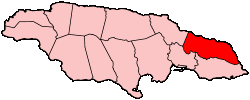
Population (1999): 79,300
Capital: Port Antonio
Major Towns: Buff Bay, Manchioneal

The parish of Portland was established in 1723 through the merging of the parish of St. George with a portion of St. Thomas-in-the-East. Named after Henry, Duke of Portland—then governor of Jamaica—its first major town, Titchfield, was eventually eclipsed by Port Antonio, whose name dates back to the Spanish “Puerto Santo Antonio” (1685).
Early settlement of Portland was hindered by rampant tropical diseases and frequent Maroon raids. In 1725, legislation was enacted to control disease, and in 1729, Fort George was built to safeguard the area. By 1739, a treaty with the Maroons was signed, encouraging new sugar estates. However, unsuitable climatic conditions led to the collapse of all 138 estates by the early 1800s, shifting the region toward banana cultivation and subsistence farming.
A turning point came in 1871 with the arrival of Lorenzo Dow Baker, a fruit-shipping entrepreneur who propelled Portland’s banana export industry and spurred rapid development in Port Antonio. By the 1930s, however, disease and other complications led to the industry’s decline, returning Port Antonio to a more tranquil state. Today, eco-tourism forms the backbone of Portland’s economy.
From the outset, tropical diseases and Maroon raids slowed Portland’s settlement. Legislative efforts to curb disease in 1725 and the construction of Fort George in 1729 brought some stability, yet the sugar estates failed to adapt to the region’s climate. The introduction of bananas, led by Lorenzo Dow Baker in the late 19th century, launched a wave of prosperity centered around Port Antonio. Although the banana industry declined by the 1930s, it laid the groundwork for Portland’s subsequent focus on eco-tourism.
Agriculture: Agriculture remains crucial, with the fertile coastal plains supporting bananas, coconuts, and breadfruit. Even though banana production never fully recovered its former glory, farming is still a mainstay for many locals.
Tourism: Portland caters to both eco-enthusiasts and affluent travelers, boasting luxury accommodations such as Trident Villas, Jamaica Palace, and Dragon Bay Villas. Its pristine environment and lush landscapes form the basis of a thriving eco-tourism sector.
Film/Screen Productions: The dramatic scenery of Portland has served as the backdrop for more than 700 film and TV productions, including classics like Two Thousand Leagues Under the Sea (1954) and the cult favorite The Harder They Come (1972). These projects, though periodic, offer valuable employment and economic benefits.
Manufacturing: With around 18 factories, the parish’s manufacturing sector, though modest, provides essential jobs and supports local commerce.